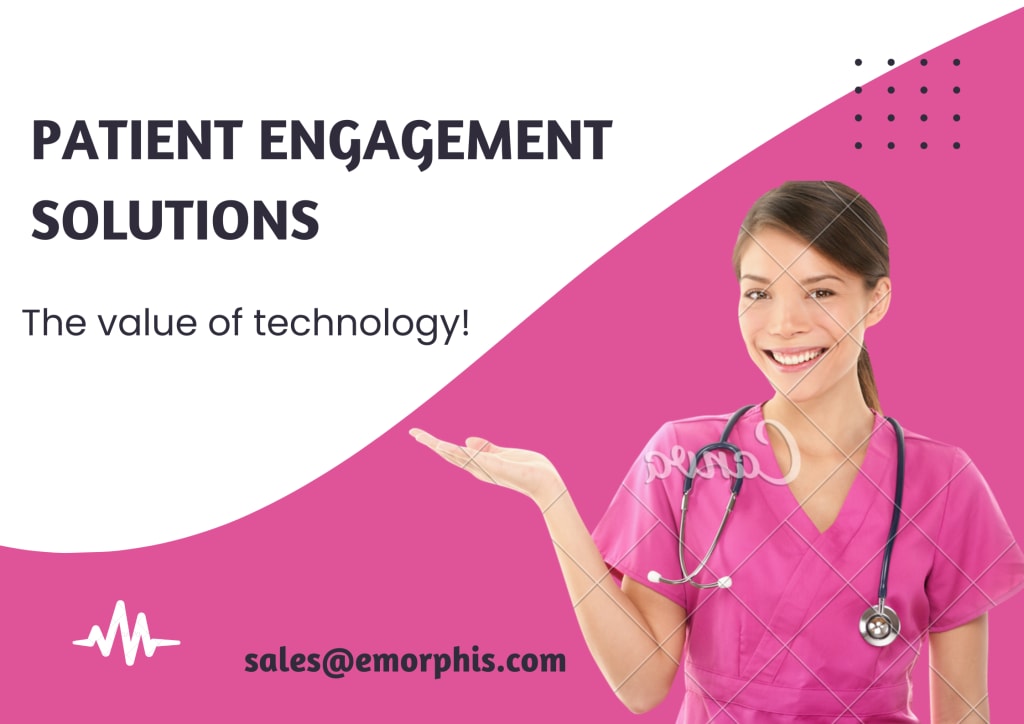Patient Engagement Solutions-The value of technology!
Patient Engagement

What is Patient Engagement in Healthcare?
Patient engagement refers to the collaboration and active participation of patients in their own healthcare. It involves involving patients in decision-making about their health, treatment options, and ongoing care management.
Patient engagement can take many forms, including shared decision-making between the patient and healthcare provider, patient education and self-management programs, and patient feedback on healthcare app solutions. It is essential for healthcare providers to engage patients in their healthcare to improve treatment outcomes, patient satisfaction, and overall healthcare quality.
Different Types of Patient Engagement Solutions
Patient engagement solutions refer to the strategies, tools, and technologies used to actively involve patients in their own care. Here are some different types of patient engagement solutions:
Patient portals: These are online platforms that allow patients to access their medical records, communicate with their healthcare providers, and schedule appointments.
Mobile apps: Healthcare providers can use mobile apps to engage with their patients, provide them with personalized health information, and enable them to track their health goals and progress.
Wearable technology: Devices like fitness trackers and smartwatches can be used to monitor patients' health, track their physical activity, and alert them to potential health issues.
Telehealth: Telehealth allows healthcare providers to interact with patients remotely, providing care and support through virtual consultations, video calls, and messaging.
Patient education: Healthcare providers can provide patients with educational materials, such as pamphlets, videos, and online resources, to help them better understand their health conditions and treatment options.
Social media: Healthcare providers can use social media platforms to engage with patients, provide health information, and foster an online community of patients who can support one another.
Which types of Healthcare Organizations need Patient Engagement apps?
Patient engagement apps can be useful for a variety of healthcare organizations, including:
Hospitals: Hospitals can use patient engagement apps to improve the patient experience, provide patients with access to their health information, and enable them to communicate with healthcare providers more easily.
Clinics: Clinics can use patient engagement apps to reduce wait times, streamline appointment scheduling, and provide patients with educational resources and self-care tools.
Primary care practices: Primary care practices can use patient engagement apps to improve patient engagement, provide patients with remote monitoring and support, and facilitate communication between patients and healthcare providers.
Specialty care practices: Specialty care practices can use patient engagement apps to provide patients with condition-specific education and support, as well as tools and resources to help them manage their conditions.
Long-term care facilities: Long-term care facilities can use patient engagement apps to improve communication between staff and residents, provide residents with access to health information and educational resources, and enable remote monitoring of residents' health.
Home health agencies: Home health agencies can use patient engagement apps to provide patients with remote monitoring and support, medication reminders, and educational resources.
Overall, any healthcare organization that is focused on improving patient outcomes, enhancing the patient experience, and providing patients with access to the resources and support they need to manage their health can benefit from patient engagement apps.
Patient feedback: Soliciting patient feedback can help healthcare providers improve the patient experience and tailor their care to meet patients' needs and preferences.
Best Patient Engagement Technologies
There are many patient engagement technologies available that can help healthcare providers improve patient outcomes and overall quality of care. Here are some of the best patient engagement technologies:
Remote monitoring devices: Remote patient monitoring devices such as wearable fitness trackers, smartwatches, and wireless scales can help patients and healthcare providers track a range of health indicators such as heart rate, blood pressure, and blood glucose levels. This data can be used to identify potential health problems early and adjust treatment plans as necessary.
Patient portals: Patient portals are secure online platforms that allow patients to access their medical records, schedule appointments, and communicate with their healthcare providers. These portals can be used to improve patient engagement by providing patients with convenient access to their health information and enabling them to take a more active role in their care.
Telehealth: Telehealth technologies such as video conferencing, messaging, and remote monitoring can help healthcare providers deliver care and support to patients who are unable to visit the clinic in person. This can be particularly useful for patients with chronic conditions who require ongoing care and monitoring.
Patient education software: Patient education software can be used to deliver personalized health information to patients in a way that is easy to understand and access. This can include interactive videos, animations, and educational games that help patients learn about their health conditions and treatment options.
Chatbots and virtual assistants: Chatbots and virtual assistants can be used to provide patients with 24/7 access to basic health information and support. These technologies can help patients manage their conditions, monitor their symptoms, and receive personalized advice on how to improve their health.
Mobile health apps: Mobile health apps can be used to provide patients with personalized health information, medication reminders, and support for healthy behaviours such as exercise and nutrition. These apps can be particularly useful for patients with chronic conditions who require ongoing support and monitoring.
Overall, the best patient engagement technologies are those that are tailored to the specific needs of individual patients and provide them with the support and resources they need to take an active role in their own care.
About the Creator
Larisa Albanians
Hey, a healthcare technology solutions provider at emorphis, that is helping organizations to deliver better healthcare solutions.






Comments
There are no comments for this story
Be the first to respond and start the conversation.